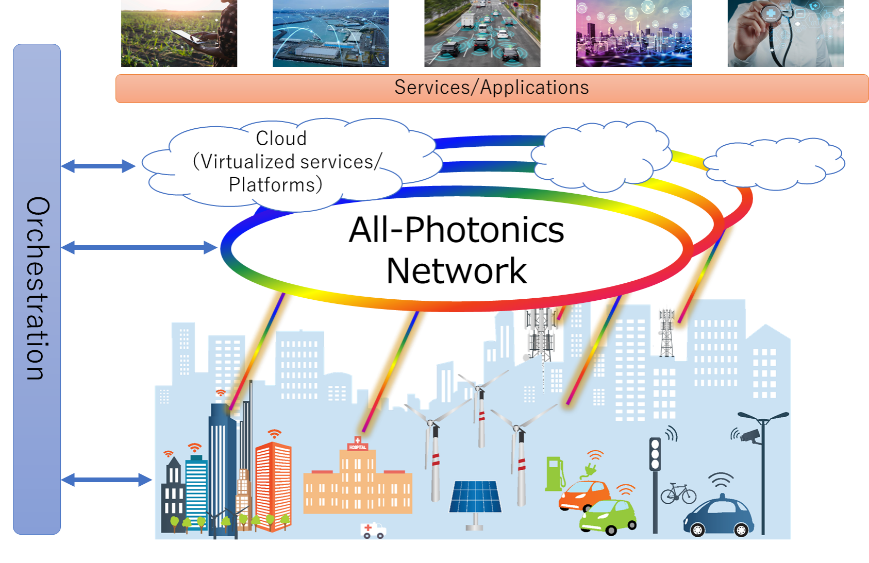NTT and KDDI signed a basic agreement to promote global standardization of optical network technologies
Tokyo - Nippon Telegraph and Telephone Corporation (hereinafter NTT) and KDDI Corporation (hereinafter KDDI) signed a Memorandum of Understanding (hereinafter MOU) to promote global standardization in the field of optical networks, such as optical transmission technology, mobile network technology and its operations management technology, where both companies can leverage their technological strengths. For that purpose, both companies will accelerate open innovations with partners around the world, aiming to contribute to global standardization.
NTT and KDDI have so far led the research and development of optical networks in Japan. Both have been researched and developed high-capacity optical communication systems for domestic terrestrial links and ultra-long haul and high-capacity optical submarine cable systems for a transoceanic link. And then, successfully implemented the high-capacity optical communication systems in the real world, which now becomes one of the social infrastructures.
In the Beyond 5G/6G era, the data volume generated from smartphones and other devices is estimated to increase more rapidly than ever. In the meantime, enormous information transmitting, processing, and storing will be required, and those must be efficiently implemented with low power consumption as carbon neutrality is ICT (information and communication technologies) industry's mission. In order to solve these complicated problems and make innovative services continuously available in the future, it is indispensable to conduct advanced and latest research and to develop optical networks promptly by utilizing open innovation, and to accelerate their implementation worldwide by means of well-established global standards.
In response to these challenges, NTT and KDDI decided to work together to realize such all-photonic networks based on their experience in R&D activities over the ICT domain.

Overview of the MOU
NTT and KDDI will jointly investigate how to achieve a sustainable high-capacity optical network to prepare for the challenges of the Beyond 5G/6G era. Both companies will also accelerate the research and development of optical networks with open innovation communities, aiming to standardize innovative communication technologies and deploy them in the real world on time.
1. Standardization of transmission characteristics for All-Photonics Network with both high speed and the best quality
The All-Photonics Network features low power consumption and low latency by transparently transmitting optical wavelength signals without electrical processing. On the contrary, such transparency causes another consideration that traditional optical networks do not. For example, the number of optical wavelength signals should be carefully assigned to multiple services following the design rule of an All-Photonics Network, and their transmission characteristics should be well maintained with a certain quality level by minimizing degradation due to optical fibers' nonlinearity and optical amplifiers noise.
NTT and KDDI will promote standardization activities to achieve an all-photonics network, its expansion, and the interoperability among carriers for interconnection based on their experience in the research, development and the actual implementation of optical networks all over the world.
2. Standardization of All-Photonics Networks with Mobile Communications
In the era of Beyond 5G/6G, there will also be other mechanisms in mobile network infrastructure that effectively accommodate a greater number of base stations and provide customers with a new service experience. While standardizing technologies to apply an All-Photonics Network to mobile networks, NTT and KDDI will contribute to enhancing mobile network and their services, connecting edge and cloud data centers or inter-core networks with an All-Photonics Network.
Both companies aim to realize an innovative communication infrastructure with high capacity, ultra-low latency, and high quality and reliability, accommodating various services, mainly the mobile network, on-demand with reduced power consumption.
3. Standardization of orchestration technologies
In the Beyond 5G/6G era, since the utilized ICT resources will dramatically increase while maintaining high robustness, resilient optical networks should be designed to handle such ICT resources so as to optimize their allocation and configuration and to minimize the outage of services.
NTT and KDDI will standardize optical network monitoring and control technologies where both companies have much knowledge of highly reliable optical networks under the multi-vendor as well as the multi-operator environment. They aim to realize a resilient network with their orchestration technology and mechanism to monitor and control multiple optical network domains cooperatively.
By effectively conducting the standardization activities, NTT and KDDI will utilize the Innovative Optical and Wireless Network (IOWN) Global Forum1 as one of the places to promote open innovation and utilize the outcome for the global standardization of all-photonics networks at ITU-T (International Telecommunication Union-Telecommunication Standardization Sector) and other standardization organizations.
NTT and KDDI strongly expect the early adaption of the all-photonics network as a resilient telecommunications infrastructure and contribution to a sustainable society with such innovative technologies originated.
1Innovative Optical and Wireless Network Global Forum (https://iowngf.org/)
Email Newsletters
Sign up to receive TelecomTV's top news and videos, plus exclusive subscriber-only content direct to your inbox.



